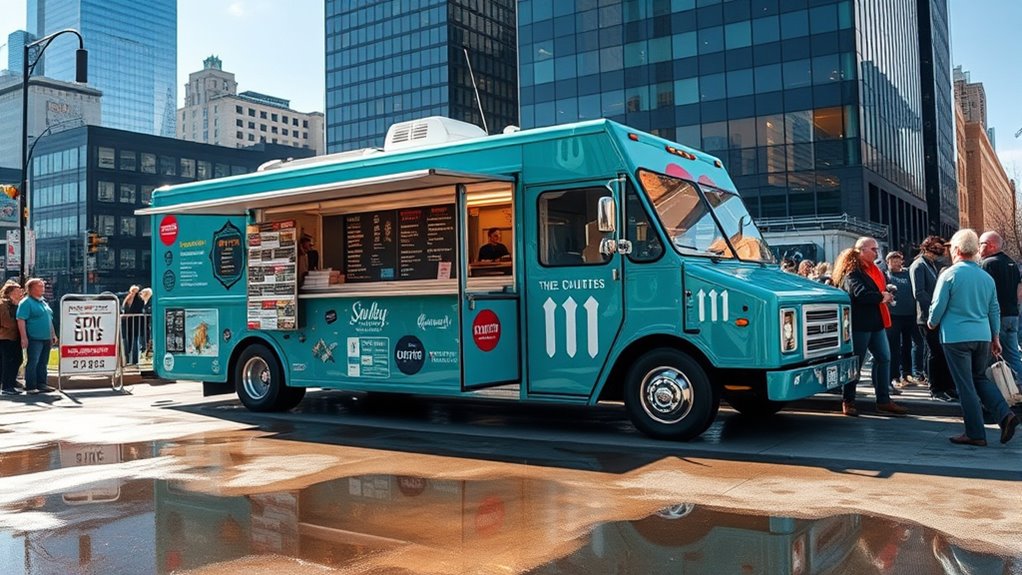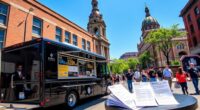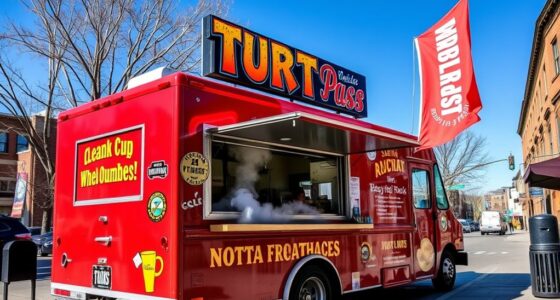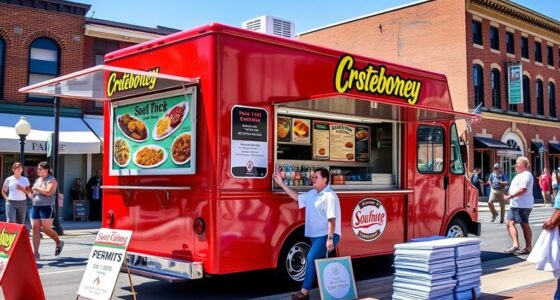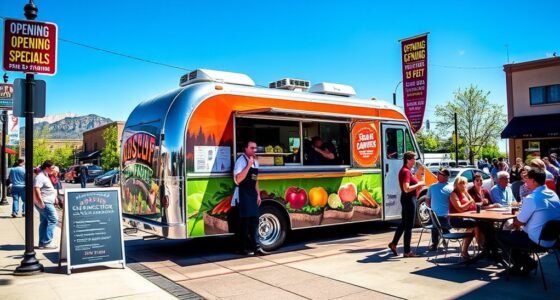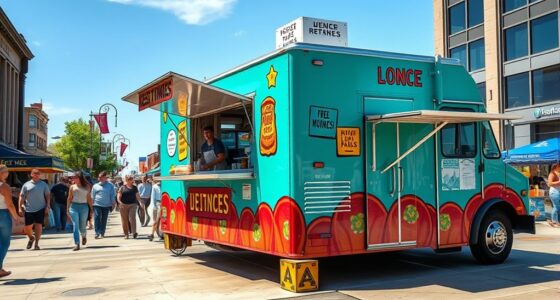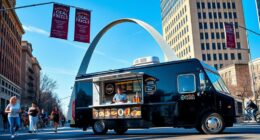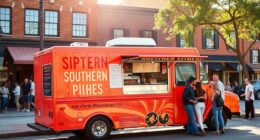To open a food truck in Minneapolis, you need to secure permits including a Mobile Food Unit license and possibly additional health licenses, with plans submitted at least 30 days prior. Costs vary from $50,000 to $200,000 plus ongoing expenses. Focus on high-traffic spots like breweries and event zones, and craft a menu with local flavors. Effective marketing builds your brand. Keep exploring for detailed tips on maintaining compliance, managing costs, and attracting customers.
Key Takeaways
- Secure necessary permits and licenses from MDH, Minneapolis, and state agencies, including plan review, MFU, and Food Truck licenses.
- Budget for truck costs ($50,000–$200,000), customization, permits, insurance, and initial inventory, with ongoing expenses like fuel and wages.
- Target high-traffic locations such as breweries, downtown office districts, and event zones near stadiums and festivals.
- Develop a menu featuring local ingredients, comfort foods with a modern twist, and seasonal specials to appeal to regional tastes.
- Build a strong brand with consistent marketing, social media storytelling, customer engagement, and community promotions.
Navigating Permits and Licenses in Minneapolis
Managing permits and licenses is a crucial step when starting a food truck in Minneapolis. You must submit a Plan Review Application to the Minnesota Department of Health (MDH) at least 30 days before construction begins. This includes menu details and equipment layout to guarantee safety compliance. You also need a Mobile Food Unit (MFU) License, which covers vehicles that prepare or serve food, and must meet Minnesota Food Code standards. For operations within Minneapolis, you must obtain a Food Truck License from the city’s Business Licenses & Consumer Services, including proof of insurance and adherence to local rules. Additional health licenses from the Minnesota Department of Agriculture or local health departments may be required, depending on your menu. If vending at special events, you’ll need written permission, but separate licenses might not be necessary. Ensuring compliance with food safety standards is essential to prevent violations and ensure customer safety.
Estimating Startup and Operating Expenses
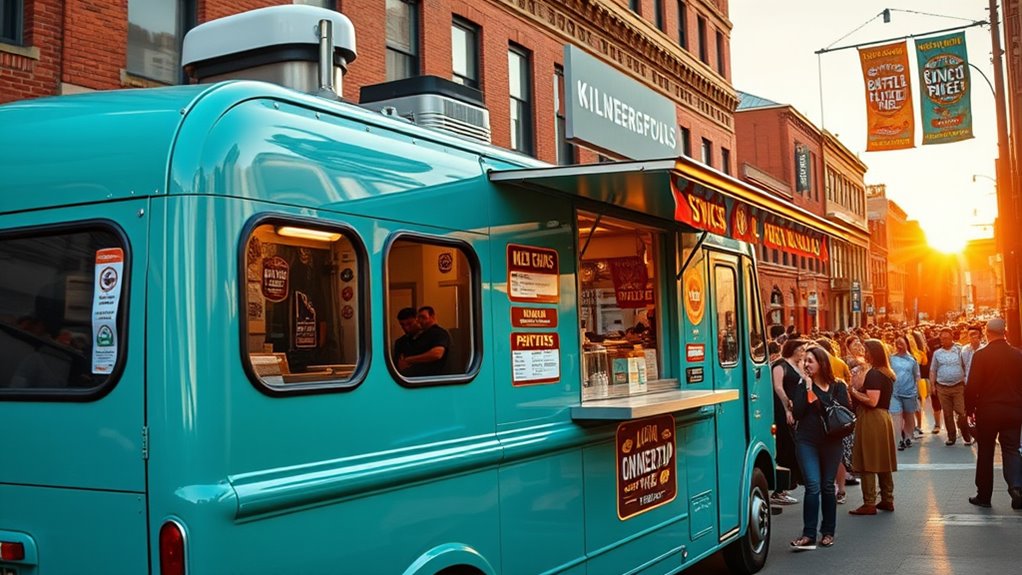
Estimating startup and operating expenses is essential for planning a successful food truck business in Minneapolis. Your initial investment for a new truck can range from $75,000 to $200,000, while used trucks cost between $50,000 and $100,000. Customization, including branding and kitchen equipment, adds another $20,000 to $50,000. Alternatively, leasing a truck can lower upfront costs to $2,000–$3,000 monthly. Initial inventory typically costs $1,000 to $5,000, depending on your menu complexity. Permit, license, and insurance fees may total $500 to $3,000, with ongoing expenses like fuel, maintenance, wages, and utilities. Marketing costs, including branding and digital outreach, range from $1,000 to $5,000 initially, with ongoing promotional expenses to support visibility and growth. Total startup costs can significantly impact your cash flow and should be carefully planned to ensure sustainability. Additionally, incorporating environmental innovations such as sustainable packaging and energy-efficient appliances can reduce long-term operational costs and attract eco-conscious customers.
Selecting Prime Locations and Zoning Considerations
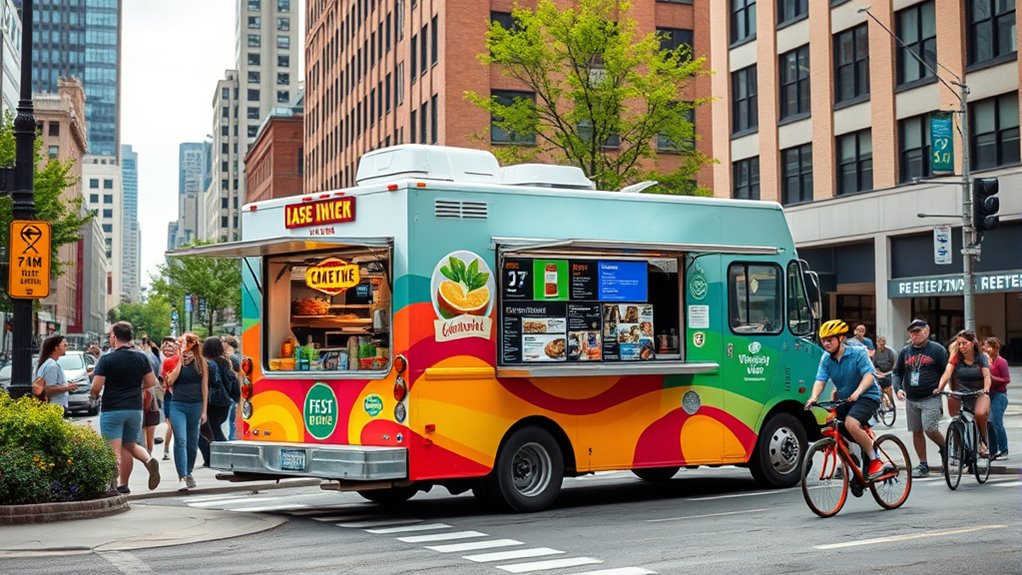
Choosing the right locations for your food truck in Minneapolis is essential for attracting customers and maximizing sales. Focus on high-traffic areas and venues that draw crowds. Here are key options:
- Popular breweries like Bauhaus Brew Labs and HeadFlyer Brewing, where casual food and beer pairings attract patrons.
- Event zones near U.S. Bank Stadium and Eat Street, offering high foot traffic during sports and cultural events.
- Downtown office districts, perfect for weekday lunch crowds and catering opportunities.
- Seasonal hotspots such as farmers markets and festivals, boosting visibility and sales.
- Paying attention to conflict resolution skills and community engagement can help build a loyal customer base and foster positive relationships in your chosen locations.
Crafting an Appealing Menu for Local Tastes
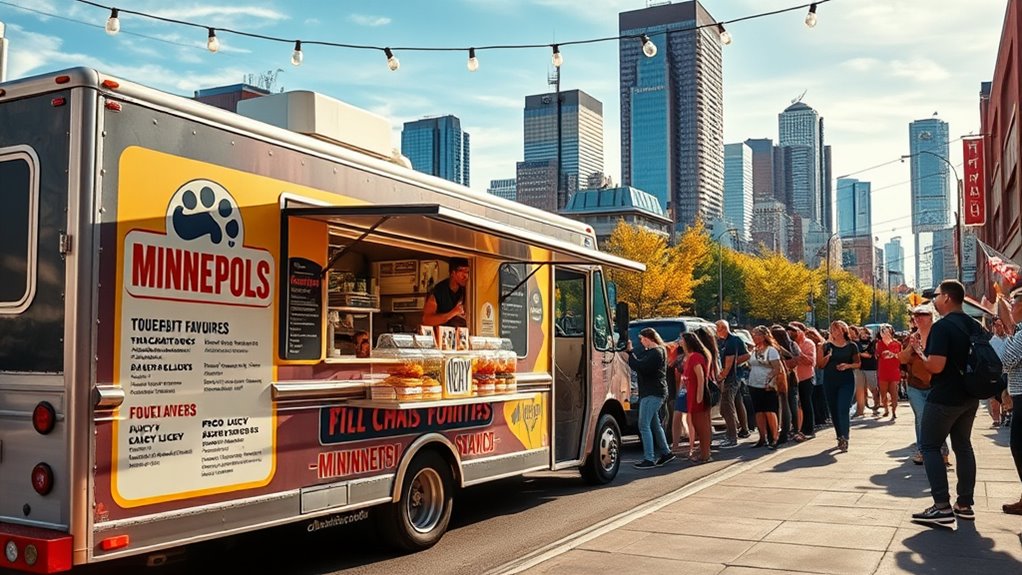
To create an appealing menu that resonates with Minneapolis locals, it’s essential to understand their diverse flavor preferences and incorporate regional ingredients. Minneapolis offers a mix of Scandinavian, Somali, Hmong, and Midwestern cuisines, emphasizing wild rice, lake fish like walleye, locally sourced meats, and seasonal vegetables. Popular dishes include comfort foods with a modern twist, such as gourmet mac and cheese and smoked meats, alongside vegetarian and gluten-free options. Focus on a smaller, curated menu with signature dishes and meal combos that highlight local flavors. Incorporate regional ingredients in specials and leverage seasonal produce to keep offerings fresh and relevant. Utilizing unique and wicked planters can also enhance the visual presentation of your food truck, making it more attractive and inviting to customers.
Effective Marketing and Customer Engagement Strategies
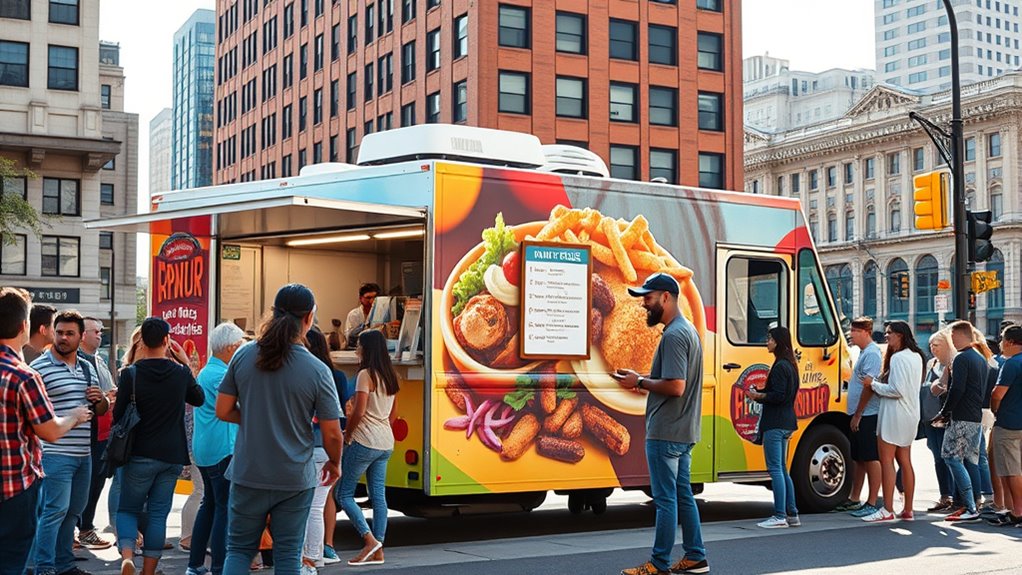
Implementing a strong marketing and customer engagement plan is essential for your food truck’s success in Minneapolis. To stand out, focus on:
- Developing a consistent visual identity, including logo, colors, and truck design, that reflects your brand personality. This helps create a memorable impression and enhances recognition among your target audience.
- Sharing your food truck’s origin story and unique selling points through social media and marketing materials to build emotional connections.
- Incorporating storytelling in posts and menus to foster brand loyalty and authenticity. Utilizing branding strategies can further strengthen your brand presence.
- Using customer-generated content by reposting tagged photos, engaging actively with followers, and running interactive promotions like check-in discounts and giveaways. Younger audiences tend to be more engaged when they see authentic stories and community involvement from brands they support.
Frequently Asked Questions
How Long Does the Permit Approval Process Typically Take in Minneapolis?
You’re wondering how long the permit approval process takes in Minneapolis. Typically, it takes about 2 to 4 weeks from the time you submit your complete application until you receive your license. This includes initial review, inspections, and final approval. Keep in mind, expedited reviews are possible if your application is thorough, but delays can happen if there are missing documents or high permit volumes.
Are There Specific Health Regulations for Organic or Specialty Food Trucks?
Did you know all food trucks in Minneapolis, including organic or specialty ones, face the same health regulations? You must follow the Minnesota Food Code, which applies equally to all mobile units. This means strict standards for food safety, equipment, and handling. You’ll need to submit detailed plans for approval, pass inspections, and get licensed. Environmental rules also encourage eco-friendly packaging, aligning with organic food values and ensuring safe, sustainable practices.
Can I Operate a Food Truck in Residential Neighborhoods?
You can’t operate your food truck in residential neighborhoods unless you get special permission or hold a permit for a temporary event. Minneapolis restricts food trucks in residential areas, especially for regular, long-term operations. You’ll need city approval, zoning considerations, and possibly an event permit. Operating without proper authorization could lead to enforcement actions, including removal of your truck. Always check with local authorities to guarantee compliance before setting up in residential zones.
What Are the Best Practices for Managing Food Truck Staff During Busy Hours?
Managing your food truck staff during busy hours requires balancing brilliance and borders. Focus on forecasting staffing needs, forming flexible schedules, and fostering friendly, focused teamwork. Train your team thoroughly, assign clear roles, and streamline workflows for swift service. Celebrate small wins, build morale, and boost teamwork. By blending planning with positivity, you’ll keep operations ideal, staff energized, and customers satisfied, ensuring your busiest hours are a booming success.
How Do Weather Conditions Affect Food Truck Operations and Planning?
Weather conditions substantially impact your food truck operations and planning. During extreme heat, you’ll need to guarantee proper ventilation and adjust menus for cooler options, while cold weather requires winterization, maintenance, and winter-specific menus. Rain, snow, or ice can delay setup, restrict access, and decrease customer traffic. To stay ahead, monitor weather forecasts, adapt your hours and menu accordingly, and communicate changes clearly through social media to keep customers engaged despite unpredictable conditions.
Conclusion
Starting your food truck in Minneapolis is like planting a seed—you need the right permits, a tasty menu, and a prime spot to grow. With careful planning, you’ll watch your business flourish just like the city’s vibrant food scene. Remember, every great journey begins with a single step. Stay focused, adapt to local tastes, and keep engaging your customers. Before long, your food truck will be rolling through Minneapolis, becoming a beloved part of the community.
